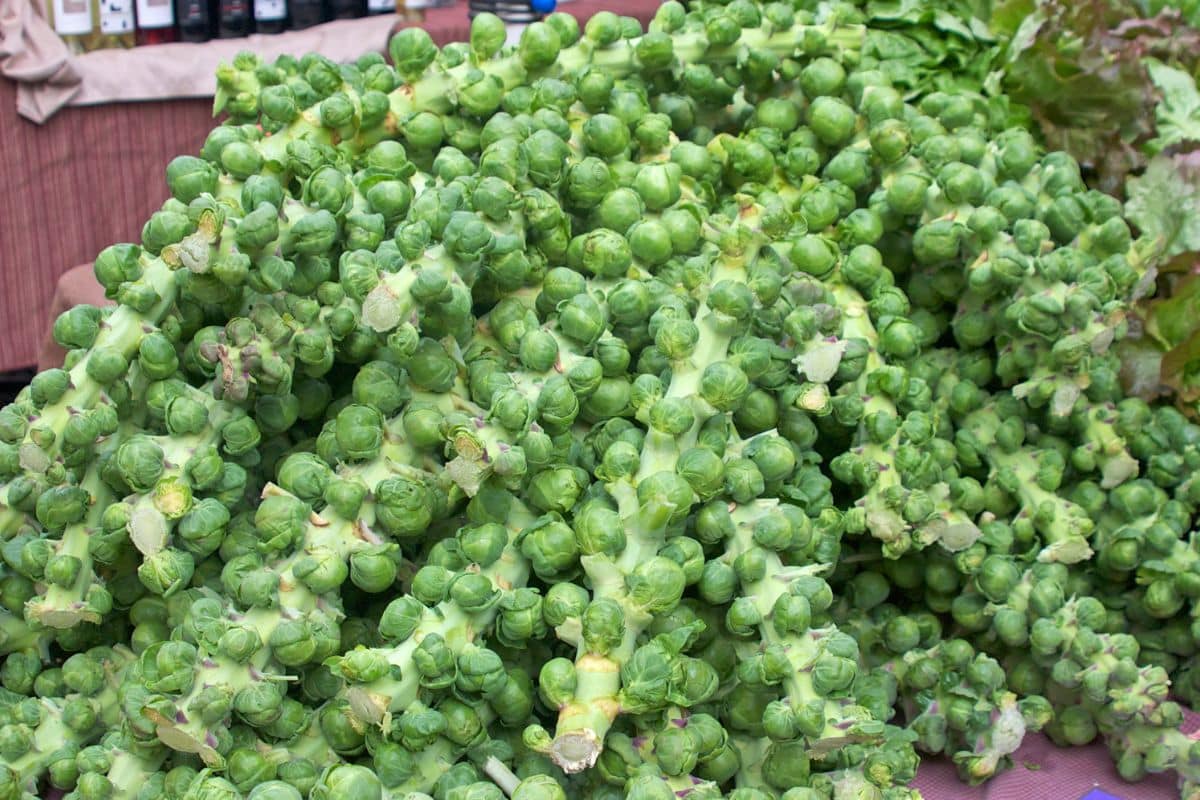Growing brussels sprouts in your garden can be rewarding, but these nutrient-dense vegetables benefit greatly from strategic companion planting. Choosing the right plant neighbors can enhance growth, deter pests, and improve flavor. Let’s explore the most beneficial companion plants for brussels sprouts and how they create a thriving garden ecosystem.
Beneficial herbs as brussels sprouts companions
Herbs make excellent companions for brussels sprouts, offering multiple benefits beyond just space efficiency. Their aromatic properties serve as natural pest deterrents while some even improve the flavor profile of your cruciferous vegetables.
Aromatic herbs like mint, rosemary, and sage release compounds that confuse and repel cabbage moths, aphids, and other common brussels sprout pests. These herbs create an invisible protective barrier around your plants through their natural essential oils.
Dill deserves special mention as it attracts beneficial predatory insects like wasps and hoverflies that feed on caterpillars and aphids threatening your brussels sprouts. This creates a natural pest management system in your garden bed.
Thyme serves dual purposes when planted near brussels sprouts. Its low growth habit provides ground cover that suppresses weeds while its strong scent masks the distinctive brassica smell that typically attracts cabbage butterflies and other problematic insects.
Consider integrating these herbs strategically throughout your brussels sprout rows:
- Mint (plant in containers to prevent spreading)
- Rosemary (provides vertical structure and winter interest)
- Sage (drought-tolerant once established)
- Dill (attracts beneficial insects)
- Thyme (excellent ground cover)
For maximum benefit, position these aromatic herbs where prevailing winds will carry their scent across your brussels sprout patch, creating an effective pest-deterrent zone throughout the growing season.
Root vegetables that pair well with brussels sprouts
Root vegetables make ideal companions for brussels sprouts because they utilize different soil layers, creating an efficient use of garden space. While brussels sprouts develop their primary root system in the top 12-18 inches, many root vegetables extend deeper, accessing nutrients that might otherwise go unused.
Turnips complement brussels sprouts particularly well as they mature quickly and can be harvested before the brussels sprouts reach their full size. This succession planning maximizes your garden’s productivity throughout the growing season.
Beets offer mutual benefits when planted near brussels sprouts. They don’t compete for the same nutrients, and their shallow root systems won’t interfere with each other. Additionally, beets attract beneficial pollinators with their flower stalks when allowed to bolt, supporting the broader garden ecosystem.
Onions and garlic serve as exceptional companion plants due to their natural sulfur compounds that repel many common brussels sprout pests. Their strong scent masks the brassica smell that typically attracts cabbage moths and other problematic insects.
Consider this strategic planting schedule for root vegetable companions:
- Plant garlic in fall for harvest when brussels sprouts are planted in spring
- Sow radishes between young brussels sprout seedlings for quick early harvest
- Plant onions around the perimeter as a protective barrier
- Introduce beets when brussels sprouts are half-grown for continuous harvesting
This succession planting approach ensures your garden remains productive while maintaining the beneficial companion relationships throughout the growing cycle.
Leafy greens and other beneficial companions
Leafy green vegetables often make excellent neighbors for brussels sprouts, creating diverse polycultures that maximize garden space and enhance overall plant health. These complementary relationships help deter pests while improving soil conditions.
Spinach works well with brussels sprouts because of its different growth habit and nutrient requirements. As a shallow-rooted crop, spinach can be harvested before brussels sprouts reach maturity, making efficient use of garden space through succession planting.
Marigolds deserve special mention for their pest-repelling properties. Their roots release compounds that deter nematodes and other soil-dwelling pests. French and African marigold varieties provide the strongest protective benefits for brussels sprouts through their natural biochemistry.
Summer squash varieties can work alongside brussels sprouts if given adequate spacing. Their broad leaves provide ground cover that helps retain soil moisture and suppress weeds, creating favorable microclimate conditions for brussels sprout development.
Nasturtiums serve as excellent trap crops, attracting aphids away from your valuable brussels sprouts. These edible flowers not only add visual interest to your garden but function as sacrificial plants that protect your main crop from pest damage.
Apple trees or other fruit trees can form beneficial relationships with brussels sprouts in larger garden settings. The dappled shade they provide during intense summer heat helps prevent bolt in your brussels sprouts while creating diverse ecological niches.
Consider integrating aromatic herbs alongside these companion plants to create a comprehensive protective community around your brussels sprouts. This multi-layered approach maximizes the benefits of companion planting through ecological synergy.
Plants to avoid planting near brussels sprouts
While many plants benefit brussels sprouts, some can hinder their growth or attract problematic pests. Understanding these antagonistic relationships helps create optimal growing conditions for your cruciferous vegetables.
Strawberries compete directly with brussels sprouts for similar nutrients and can inhibit growth. Their shallow root systems also host fungi that may affect brassica health, creating conditions for disease transmission between plant families.
Other brassica family members including cabbage, broccoli, and cauliflower should not be planted near brussels sprouts. These close relatives attract the same pests and diseases, potentially magnifying problems that might otherwise remain manageable with proper crop diversity.
Tomatoes release substances that can inhibit brussels sprout growth through allelopathic interactions. Additionally, tomatoes and brussels sprouts have conflicting needs regarding soil pH and watering requirements, making them incompatible neighbors in most garden settings.
Pole beans and climbing vines may initially seem like good companions for tall brussels sprout plants, but they compete for sunlight and can create excessive shade. Brussels sprouts require full sun exposure to develop properly, so avoid placing them near plants that might block crucial light.
Instead of these problematic companions, focus on creating diversity with compatible plants that enhance your garden’s ecological resilience. This thoughtful approach to companion planting transforms your brussels sprout patch into a productive, balanced growing environment that minimizes problems while maximizing yields.

